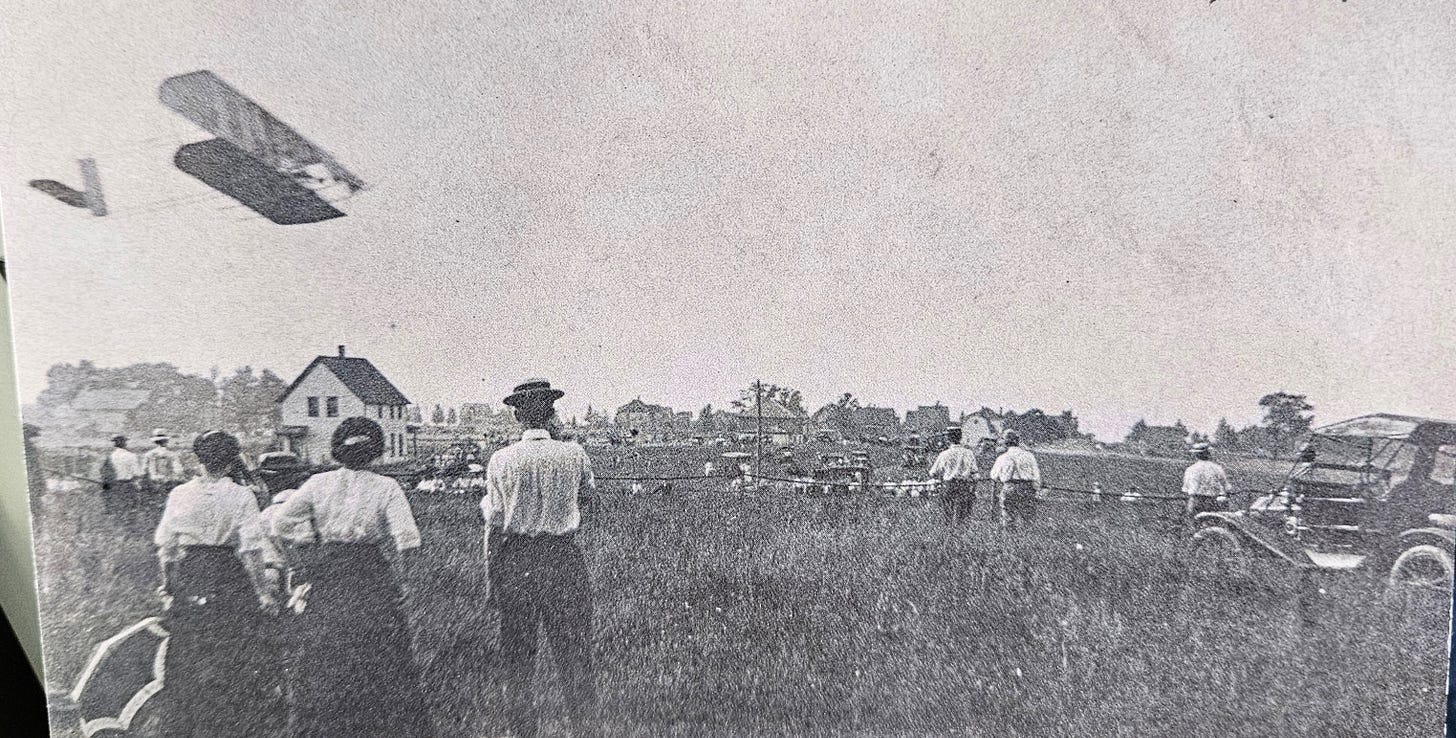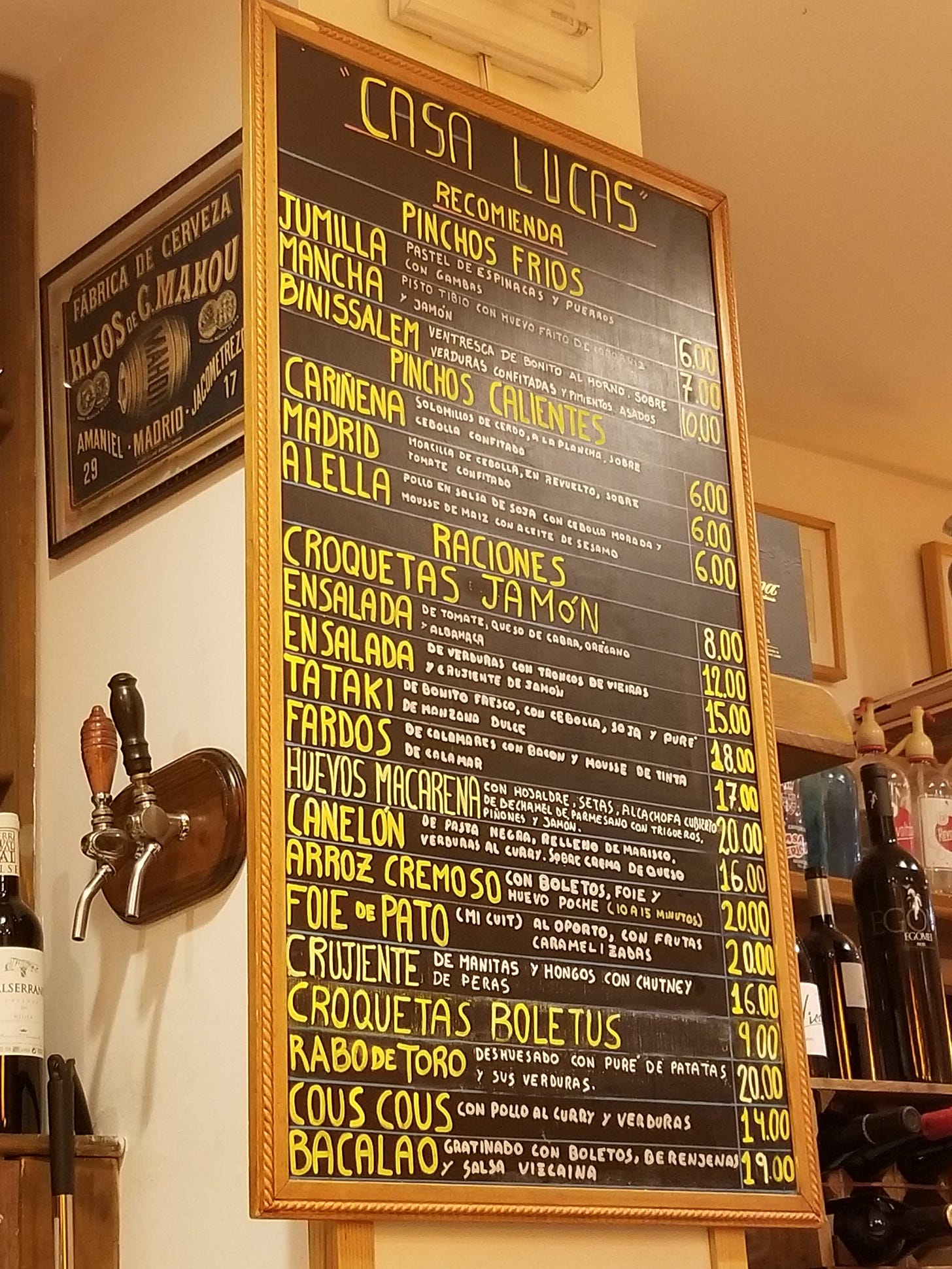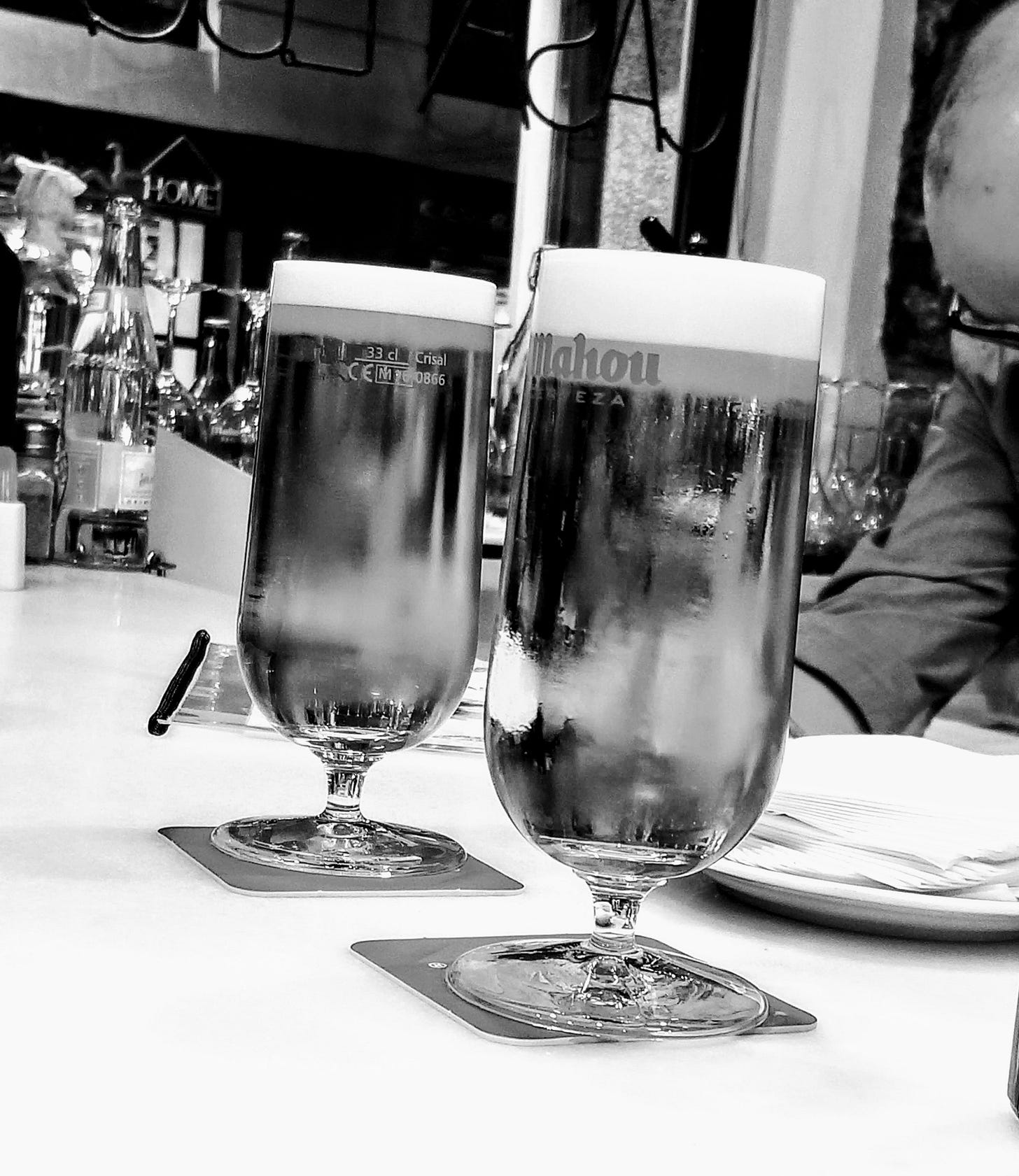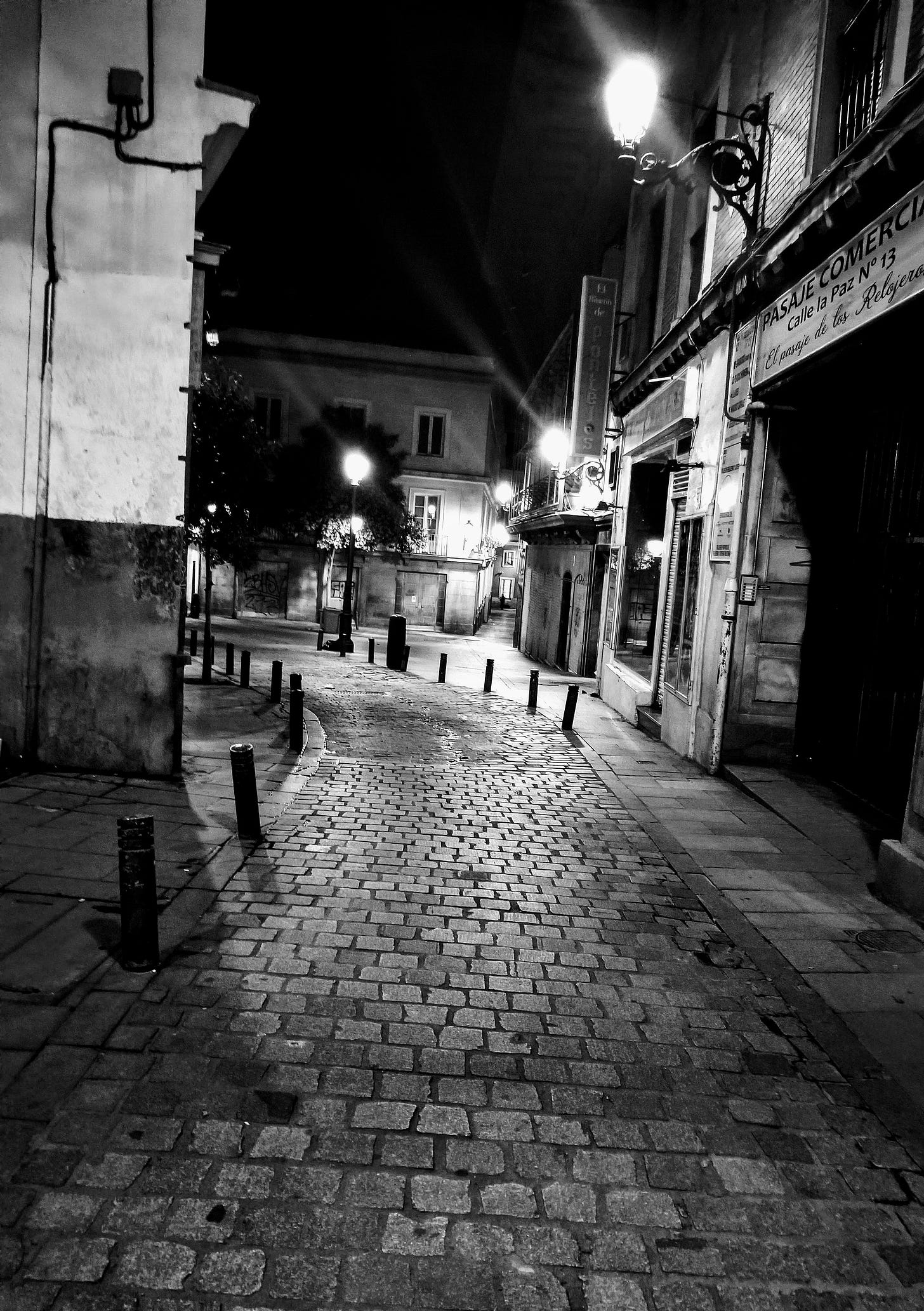“Same Walk, Different Shoes” is a community writing project that Ben Wakeman organized as a practical exercise in empathy. The premise is simple. A group of writers anonymously contribute a personal story of an experience that changed their life. Each participating writer is randomly assigned one of these story prompts to turn into a short story. The story you are about to read is one from this collection. You can find all the stories from the participating writers at Catch & Release. Enjoy the walk with us.
Beneath and Beyond
Something about the lists on the chalkboards —vinos to left, featured dishes to the right— sets me off.
My mind drifts back, to decades before, and far from the bar in a restaurant in Madrid where I sit.
Back then and there, it may have been a particular afternoon, or many such afternoons. Neil Young's voice drifts, aethereal, from an AM radio, tan in colour and turned on by my mother, real low, shortly after dawn as she left for work. To keep me company. I'm waiting for her to return.
I'm working on my list.
The one I keep under my bed, hidden away but right there, folded into a cigar box I'd found in my grandfather's basement. The box is from the Dominican Republic and has a picture of Romeo y Julieta on the lid. It’s good of Juliet to lean out over a flower-laden balcony to embrace her lover. As for the list, it’s written in pencil, I'm almost sure. To think that child-me was already allowing for revision, erasure, changes of heart.
The barman, Pablo, catches me smiling and pours another glug of Ribera del Duero into my glass.
Whether my list had a title, perhaps underlined, I couldn't say. It's intent was clear enough. "Things I want" or "When I grow up," that had been the gist. Who knows when I started the list, and how long I kept at it.
Oh to gaze on it now. To laugh over its naïveté, to ponder my priorities as an eleven-year-old boy.
But neither the relic nor its reliquary made it through my parents' divorce and into a crumbling cardboard box labelled "Orv's Things." It’s funny what did and didn't get into that box, the container-of-my-younger-self. Funny what does and doesn't make it through.
◇◇◇
Pablo is nobly grizzled, both grand and lived-in. How he looks and carries himself —even how his Madrileño Castilian sounds— goes with how he tends his bar. He keeps things at a transcendently slow simmer. I understand that a taberna such as his is a business, and that Pablo and his staff are making a living and bearing burdens that ought not be romanticised. But there’s an ancient art being perfected here in this place. An attention to detail, a mode of being that conjures quiet companionship and unexpected enchantment.
Still, the predictability of it all. Of marriage and of divorce, my parents’ and my own. Of a cardboard box, with its sharpie-pen label and pretense of being the container of a childhood. Of a barman who's seen this act, indeed the whole play, before, yet listens just the same. Of a person such as me, not old but no longer so very young, diverted from livelihood and its ends, gazing inward and back. And thus the predictability of the list scrawled by my younger self.
I'd wager that "have a good bicycle" was on it, right there near the top. Along with "grow a moustache," and just maybe, "be a writer"?
◇◇◇
I was always told I'd been named after the younger of the Wright Brothers. As if to prove it (or was it to make up for having to navigate the playground while named Orville?) there was an illustrated book about those first-flying American siblings on a shelf in my bedroom. I can still see its spot, up there between the books about the zany English veterinarian and Desmond Morris's The Naked Ape. I’d courageously commandeered the latter from my father's collection.
After the school bus dropped me off on weekday afternoons, I'd walk home down the lane, over the bridge, and let myself in. The tan radio would be waiting, left ‘on,’ playing low. There seemed to be acres of time to spare. A snack of cheddar cheese on triscuits (salty-sides down) in hand, I'd stretch out on the blue shag carpet next to that bookshelf, taking some things in, yearning for others, turning pages.
It's funny how where one was, how one was, and then what one makes of whatever one reads all come to mean more than the reading matter itself. Pablo’s tapas sure put those triscuits to shame; he raises an eyebrow at another of my little smiles, offers a little more Ribera.
Take that book about the Wright Brothers. I recall it as a welcome change from another late-night call for James Herriot to a calving in deepest Yorkshire or what could be gleaned about humans from the masturbatory habits of chimpanzees. But I learned to hide that I wasn't much interested in the flying stuff.

Something about the Disneyfied fairy tale, the readerly countdown to aeronautical triumph, put me off, and made me wary of the storytelling.
Wilbur Wright, the book's hero— scientifically inclined, surely "headed to Yale"— well, he was the worst. Unfairly no doubt, child-me imagined poor Wilbur to have embodied all that was bad about growing up, and all that was going wrong in the world. In my mind Wilbur Wright relished the bitter competition for precedence among rival flyers, sinking himself into legal struggles over patents, and then all the politicking and bickering. I imagined him standing on plush carpets among grinning men with wine glasses in their hands. Making small talk, arranging business dinners. Brilliant Wilbur this, prescient master-of-strategy Wilbur that. Oh words dripping down. Oh deepening yawn.
Orville was another matter. Were my parents aware, when they bestowed the younger brother’s name on me? Were they aware of the thing that not even the children's book could conceal: that Orville Wright danced to the beat of a different drum?
◇◇◇
My mother ‘made it’ as a woman and single-mother in the downtown office of an early-1970s engineering firm. She worked as a cog in a wheel. But it was no small thing, her post, especially in those days. It meant not slipping from a precarious perch, and —as I only came to realise much later— it meant taking care not to be underrated and let go. It meant being and looking just so. When she got home, an hour-or-so after most people's dinner-time, the house felt different, better. But my mother was exhausted, soon monosyllabic after so many hours of being charming and reliable.
I can see her. Sitting there, motionless except for the glass rising to lips from the side-table and then going down again, she has the look of iron. Nothing is easy, her whole body seems to confess.
In her cups my mother comes back to life. We trade observations; we do. But it soon becomes "Thomas said this" and "Gustavo did that," her telling stories about the people and antics in the office, where she has worked so hard to belong. I laugh. I spur her on, taking what I can get.
But not always. “I don't care about those guys," I remember blurting out. And my mother retreating into silence.
◇◇◇
When it came to Orville, the reader of the children's book about the Wright Brothers was whisked towards the grown man with the glorious moustache. Towards the everyman inventor who, alongside his beloved brother, basked in the limelight of their "Wright Flyer" and all that the first flight in December of 1903 seemed to augur. But there was no smoothing over completely —or at least, not for me— the hints at what had come before that day in Kitty Hawk.
The child-Orville had dropped out of school, having been thought dreamy and not a little impractical by his teachers. Then, as an adolescent and a young man, Orville had put a number of schemes into play that hadn't panned out. He had been wayward, "courting excess," the book primly intoned.
It had been Orville's idea that the brothers catch the late-nineteenth-century wave of bicycle-mania and design a new kind of bicycle, and then open a shop and exchange system in their hometown of Dayton. And Orville was the driving force, too, when the Wright brothers not only started a printing press but also launched a weekly newspaper, acting as roving reporters and contributing a column. Both ventures peetered out within a couple of years, like most of Orville's schemes. "Short-lived," the author of the children's book pronounced, rejoining its own triumphal path to Kitty Hawk.
But as my younger self peered through the bars of the book's dismissals, if I’m not mistaken, an inclination —a certain resolve— began to germinate within. I was attracted to things that didn’t quite work, drawn to things, and people, that almost came to be.
As Pablo checks in on me (and my wine and my pen-and-napkin) again, I am remembering how fervently I’d once wanted a fine bicycle to ride away on. How I dreamt of growing a moustache, just to distinguish me in some way. And how I wanted above all to read and express myself, learn and share what I was thinking. Perhaps I’d begin with a newspaper column like the one Orville Wright and his brother had started. The items that mattered on my child’s list, they’d be checked off. I’d grow up, sleeping and dreaming. I'd write every morning, then play boules and converse with odd characters in the afternoon, sipping wine in the shade of great plane trees. Or maybe down by a dock.
◇◇◇
I see my mother from behind, recognising her immediately. Children know their mother's shape, in any light, as if the umbilical cord is never truly broken.
It must have been around the same time as I was working on my list.
She is up on the wooden bleachers beside the soccer field by the school. I'd been injured in the first half, I think. Having had my ankle taped by the coach, a Mr Givens, on the tailgate of his truck in the parking lot, I’m limping back to the pitch. I look up as I pass the tiered benches, hoping for a smile, a nod of encouragement for her flush-faced, wounded warrior. My mother looks beautiful and strong, and I feel a charge of pride. But she’s otherwise engaged, and the feeling drips away. She’s turned, in battle, lighting into some parent of a boy on the other team, and with such verbal venom that only the sympathy I get is in a raised-eyebrow glance from Mr Givens.
Did I feel compassion for my mother in this moment? Did I think over what lay behind her becoming so upset? Was I even able to show my gratitude to her for leaving early from work and attending my games?
How caught up I was —then and at other times— in my own feelings, in my suffering and humiliation.
◇◇◇
My barman in Madrid rightly expects his patrons to be present. And if I’d kept my distraction to bouts of daydreaming about parents and pathways, about regrets and shame, I’d have been fine. Such inattention is indulged, such reverie expected.
But I've just been caught surreptitiously google-searching Wrightiana on my mobile phone beneath the bar's overhang . . .
I try to make amends by telling Pablo about the list, and about my mother, and the Wrights. And then about Orville, too, referring to things recalled from long ago and that I’ve just discovered. About what became of the younger Wright brother in later life. I’m aware of releasing a torrent, surely testing even this person’s patience.
But Pablo sticks with me. I ask him if he knew about an ageing Orville Wright’s ruminations on the scale of destruction and death long-range bombers had made possible during the Second World War? He’d compared the spread of flight to fire. Intended as good for humanity, I try to explain, and with so many potentially beneficial uses, . . . but just think of the ‘terrible damage.’
Pablo takes a moment to think, wiping off his counter, pulling himself a foaming caña of beer and taking a sip.
"In truth, En verdad, all I knew about los hermanos Wright," he says, "was the story of their flying machine, el cuento de su máquina voladora." Pablo pauses. "But from what you say, there's more to the story, beneath and beyond, debajo y más allá.”
Pablo attends to his other customers, pouring a glass of wine, checking on a woman's canelón de pasta negra, drawing a couple more cañas,
but before long he’s back, picking up where he’d left off.
“And this Orville, the younger one, el jovencito, he matters,” Pablo smiles. “He's a rare bird, un bicho raro. The kind that comes along only every once in a while, de vez en cuando, the kind to watch out for, a dreamer, a soñador, who just keeps wishing and trying."
And with this the barman’s off again, leaving me bedazzled and, again, to my own devices.
◇◇◇
I'd also turned up that the Wright Brothers had published a reflection on their mother's life in the wake of her death. "Our Mother" takes up the entire second page of their newspaper on 3 July 1889. While Pablo is occupied in the back, I quickly pull up a downloaded scan of it on my phone. The obituary is surrounded by local advertisements for hats, meat, lace curtains, and musical instruments. "Notice our bargains," pleads the ad for W. A. Lincoln's.
The brother-authors share their admiration for Susan Catherine Wright's "sound judgement," her "retiring disposition," and for how she had "heroically borne" many "years of affliction." On and on it goes in similar vein, somehow both loving and reticent, jarringly so to my modern eyes.
This was how the life of a late-nineteenth-century mother, a woman (and the wife of a clergyman) could be remembered in my namesake's —that other Orville's— time. But there’s no hiding from something else, something more timeless and unmistakably human, tucked within this reflection too.
Something about how any of us wend our ways. About how the experience of pain, and thus memories of loved ones and ourselves get cloaked in silence.
◇◇◇
I settle my bill, and bid farewell to Pablo and his portal onto what lies beneath and beyond. I decide to push my bicycle back through the quiet night of La Latina to my room.
In bed, beside a desk strewn with paper, napkins, lists, I slip into dream, into the arms of a newly gentle blur.
* Photographs by Kenneth Mills, with the exception of “Wright Bi-plane, July 4th, [19]11, Battle Creek, Mich,” from the Clements Library at the University of Michigan, Ann Arbor, MI, USA.
** Many thanks to an anonymous writer for the prompt, and to Ben Wakeman for the inspiring project, and for his patient nudging and herding of the cats.
*** If you've enjoyed this fictional interlude, check out my Dispatches — journeys near and far — which features short writing, photographs, drawings and paintings. Subscribe for free and spread the word. Comments and discussion most welcome.







Just take me on a walk and talk about everything and nothing...I so much enjoyed wandering into this piece
Impeccable, Kenneth. That line I restacked made my heart ache in new ways I didn’t even know it could.